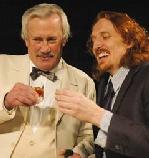SITE GUIDE
SEARCH
REVIEWS
REVIEW ARCHIVES
ADVERTISING AT CURTAINUP
FEATURES
NEWS
Etcetera and
Short Term Listings
LISTINGS
Broadway
Off-Broadway
NYC Restaurants
BOOKS and CDs
OTHER PLACES
Berkshires
London
California
New Jersey
DC
Philadelphia
Elsewhere
QUOTES
TKTS
PLAYWRIGHTS' ALBUMS
LETTERS TO EDITOR
FILM
LINKS
MISCELLANEOUS
Free Updates
Masthead
A CurtainUp Review
Mark Twain Blues
By Elyse Sommer
|
They {Huckleberry Finn and Jim} gave me the greatest book I'd ever write, but I couldn't finish the damned thing. The world was waiting for it —my creditors were waitin' for it. . .Oh I needed the money too bad, maybe that's why I couldn't finish it. .—a depressed Mark Twain talking to the characters who are haunting him about the book's often disputed ending .
|

Bill Tatum and Lance Olds in Mark Twain Blues
(Photo: Peter Sylvester)
|
review continues below

With one of the theater's very much alive wits, David Ives, sprucing up a little known Twain play, Is He Dead?, the long dead author's name is lighting up a Broadway marquee this season, Mark Twain's Blues certainly couldn't be more timely. To underscore that timeliness there's the fact that Ernest Hemingway, another literary icon who once declared that all modern American literature began with Huckleberry Finn, is also much in evidence this season— as a character in two biodramas, The Maddening Truth and The Jazz Age; and as playwright via a new production of The Fifth Column).
Walt Stepp wrote the music and lyrics to accompany his play. Twain is apparently credited as co-lyricist to acknowledge the influence of his words. The plot was inspired by the disagreement surrounding Huckleberry Finn's hi jinx ending. While Hemingway advised people to stop reading the book "where the Nigger Jim is stolen from the boys," others, including poet T.S. Elliot, pronounced the ending to be just fine. The resulting conceit is to picture a sixty-five-year-old Twain on one of his lecture tours. His depression over a devastating personal loss coupled with writer's block triggers regretful ruminations about how he should have ended his finest book. This reflective mood leads to the imagined arrival of Huck and Jim during the question and answer session at the end of the lecture. No sooner are these characters sprung from the recesses of Twain's mind than they take over the show and more or less re-create the events leading up to that controversial fork in Huckleberry Finn's denouement. They also get to sing most of the show's nineteen songs, though a half dozen are interspersed in the lecture that sends them up the aisle and onto the stage.
Stepp has concocted his conceit for three male actors to play Twain, Huck and Jim; and for one woman to take on the multiple roles of Twain's mother, Aunt Sally, Clara and Emmeline. The actors — Bill Tatun as Twain, Lance Olds as Huck and Barry Phillips as Jim and Bonne Kramer in all the female parts — embrace their characters with obvious enthusiasm. Olds and Phillips do the most justice to the pleasantly melodic score.
Pleasant and easygoing is the overarching adjective for everything else about this show: From Tom Herman's direction, to David Wolfson's one-man piano accompaniment, to Jen Varbalow's colorful and unfussy set, and to Cathy Small's costumes. But it would take the wit of a David Ives and a less contrived plot to make this overall pleasantness rise above the level of the community and small summerstock theaters where this enterprise is most likely to find its audience.
Ultimately, this is a form of entertainment, Les Gutman in a long ago review of a play about the grandsons of Huckleberry Finn and Tom Sawyer (H. Finn) called the "Theater of Recognition," a genre which succeeds by having its audience recognize the references upon which it is constructed. What was true of the Twain spinoff Les reviewed is true of Mark Twain Blues. The more of a Mark Twain fan you are and the more likely to embrace anything about him, the more likely you are to enjoy this latest spin on his legend.
LINKS TO OTHER TWAIN-RELATED SHOWS
Is He Dead?
H. Finn
Mark Twain Tonight
|
MARK TWAIN'S BLUES Directed by Tom Herman Music Direction by David Wolfson Cast: Bonne Kramer, Lance Olds, Barry Phillips and Bill Tatum Set Design: Jen Varbalow Costume Design: Cathy Small Lighting Design: Charles Forster Sound Design: Christopher Rummel Music Director & Vocal Arrangements: David Wolfson Choreographer: James Beaudry Running Time: 1 hr 50 mins with Intermission. Altered Stages , 212 West 29th St www.MarkTwainsBlues.com 212-868-4444 From 2/15/08; opening 2/21/08; closing 3/08/08 Thursdays through Saturdays at 8:00 PM, Sundays at 5:00 PM and Mondays at 8:00 PM (with no performance on Monday, March 3rd). Tickets are $18 (Thursdays are Pay-What-You-Can Night). General Admission Reviewed by Elyse Sommer at Feb. 18th press performance The show moves on to the DR2 Theatre for an extended 6 week off-Broadway run. 103 East 15th St. The performance schedule is Wednesdays through Saturdays at 8:00 PM, with matinees on Wednesdays at 2:00 PM and on Saturdays and Sundays at 4:00 PM. Tickets are $40 at (212) 239-6200 |
Try onlineseats.com for great seats to
Wicked
Jersey Boys
The Little Mermaid
Lion King
Shrek The Musical

The Playbill Broadway YearBook

Leonard Maltin's 2007 Movie Guide


Wicked
Jersey Boys
The Little Mermaid
Lion King
Shrek The Musical

The Playbill Broadway YearBook

Leonard Maltin's 2007 Movie Guide


